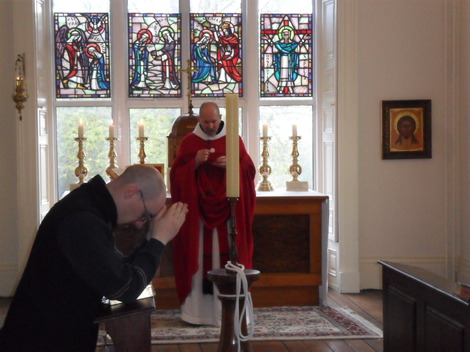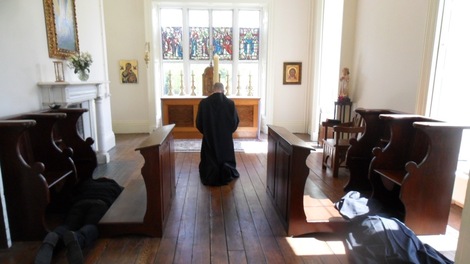Speaking and Not Speaking

Ad Altare Dei
Saint Benedict’s Instruments of Good Works prepare us, hour by hour, and day by day, to approach the Holy Mysteries. All of life is thus ordered to the Most Holy Eucharist, and all of life flows from It. This photo was taken during Conventual Mass at the moment of the Ecce Agnus Dei before Holy Communion. In the foreground is the column surmounted by a candle at which one of us makes the Act of Reparation each day after Holy Mass. The monk making reparation places the cord about his neck as a sign of communion with the Lamb of God led to immolation, and as an expression of solidarity with all poor sinners, with unbelievers, with those alienated from the Church, and with those who will never linger in the presence of Our Lord’s Eucharistic Face to adore Him, and to say “Yes” to His love.

CHAPTER IV. What are the Instruments of Good Works
20 Jan. 21 May. 20 Sept.
Saint Benedict groups together four instruments pertaining to speech:
52. To keep one’s mouth from evil and wicked words.
53. Not to love much speaking.
54. Not to speak vain words or such as move to laughter.
55. Not to love much or excessive laughter.
Learning to Hold One’s Tongue
The man who knows how to control his tongue will also be able to control a multitude of other unruly impulses. The man who has an unruly tongue will be hard-pressed to rein in his other impulses. Saint Benedict took to heart the teaching of Saint James the Apostle:
A man who is not betrayed into faults of the tongue must be a man perfect at every point, who knows how to curb his whole body. Just so we can make horses obey us, and turn their whole bodies this way and that, by putting a curb in their mouths. Or look at ships; how huge they are, how boisterous are the winds that drive them along! And yet a tiny rudder will turn them this way and that, as the captain’s purpose will have it. Just so, the tongue is a tiny part of our body, and yet what power it can boast! How small a spark it takes to set fire to a vast forest! And that is what the tongue is, a fire. Among the organs of our nature, the tongue has its place as the proper element in which all that is harmful lives. It infects the whole body, and sets fire to this mortal sphere of ours, catching fire itself from hell. Mankind can tame, and has long since learned to tame, every kind of beast and bird, of creeping things and all else; but no human being has ever found out how to tame the tongue; a pest that is never allayed, all deadly poison. We use it to bless God who is our Father; we use it to curse our fellow men, that were made in God’s image; blessing and cursing come from the same mouth. My brethren, there is no reason in this. Does the fountain gush out fresh and salt water from the same outlet? (James 3:2-11)
Benedictine Gravitas
Let it be said, once and for all, that Saint Benedict, being a wise man of great humanity, is not opposed to a wholesome mirth nor to gladness of heart. He does, however, proscribe noisy agitation and the giddy silliness of the immature man who never takes life seriously. The man who makes a joke of everything, the “hail fellow well met” who goes about slapping others on the back and laughing in loud guffaws will be either an entirely political creature content with a superficial popularity or a buffoon incapable of winning a considered respect. There is a certain Benedictine gravitas that should characterize a monk, without in any way making him gloomy or unsociable; it is a demeanour that is gentlemanly and simple, without artifice and serene.

Beautiful Dom Mark, thank you for giving us a glimpse and a reminder of the power of the tongue.: the very place we receive Our Lord Jesus. Fitting that the “rope” of reparation is nearby-a very worthwhile image to bear in mind.